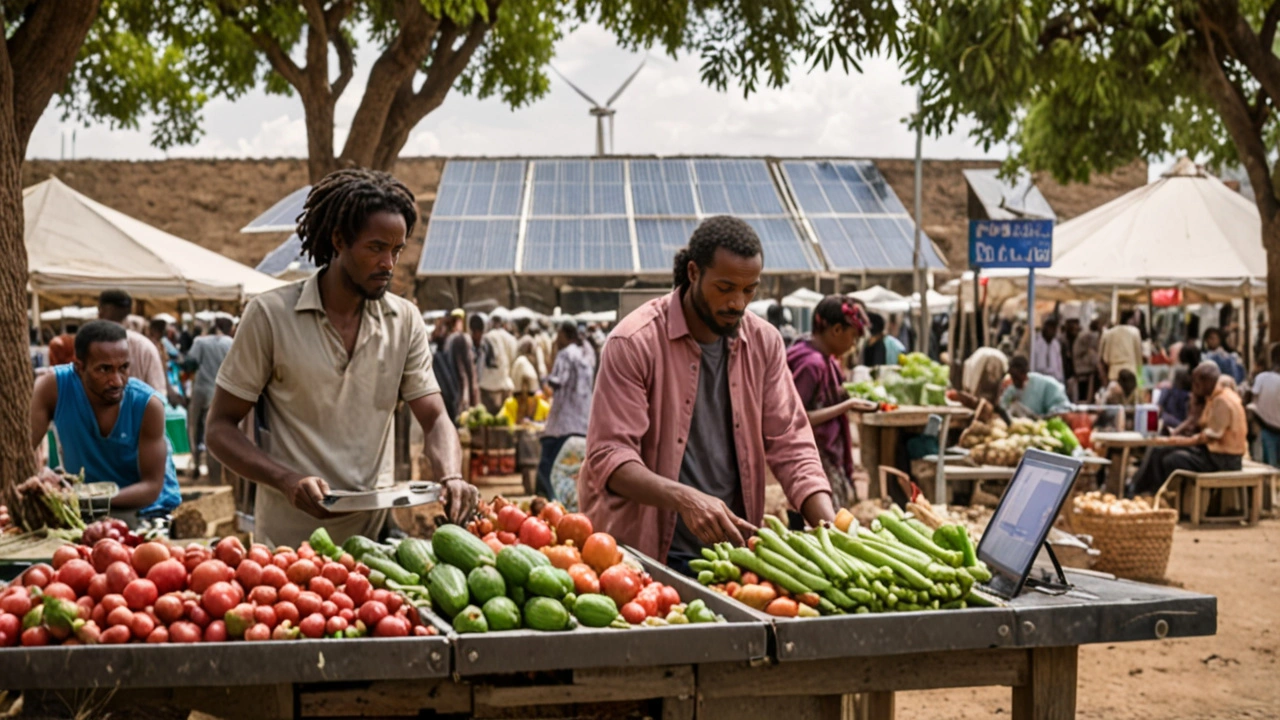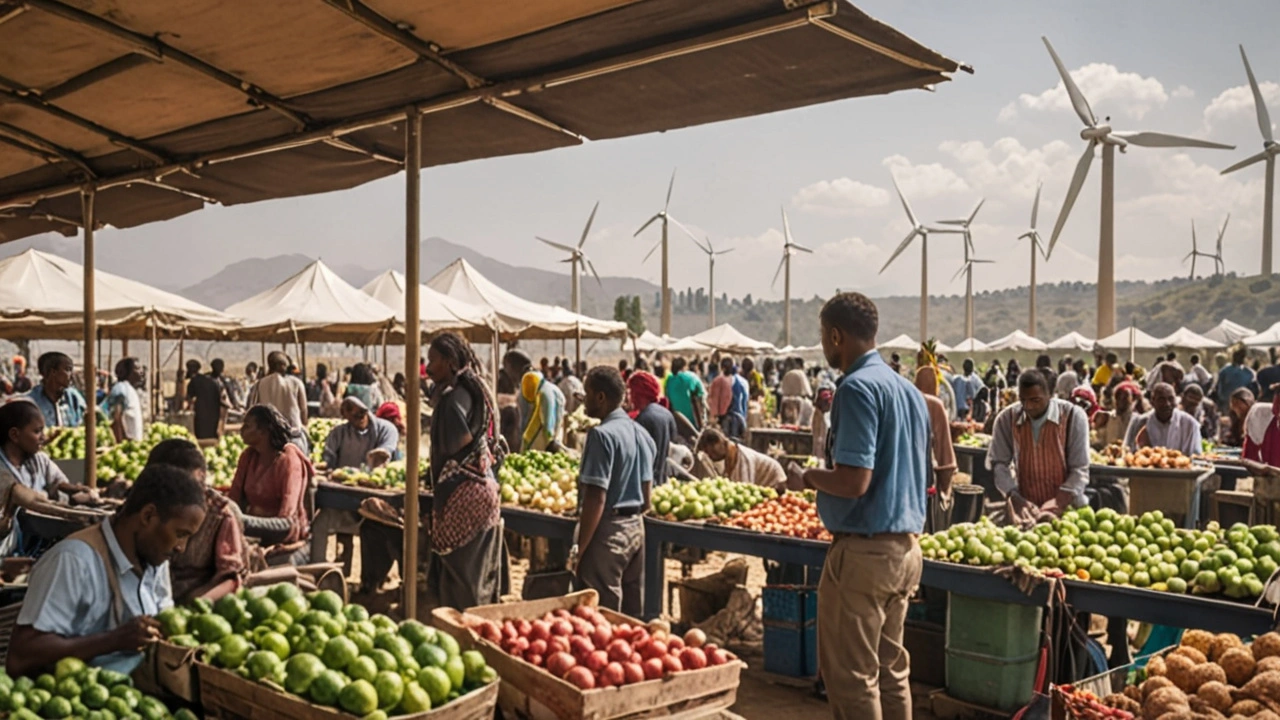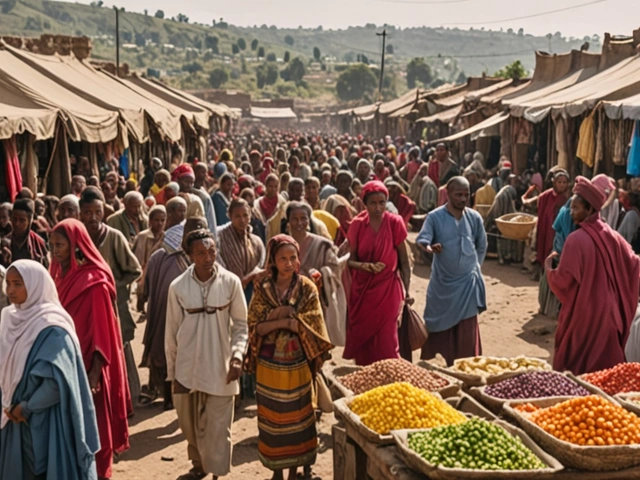Exploring investment opportunities in Ethiopia opens up a world of potential. The country's diverse and dynamic economy offers a range of sectors for investors to dive into.
One major area is agriculture, which remains a backbone of Ethiopia's economy. Rich soil and favorable weather conditions make it an ideal place for crop production and livestock farming.
The manufacturing sector is also burgeoning, driven by government incentives and an ever-growing workforce. From textiles to food processing, there are ample opportunities for setting up and scaling businesses.
Energy is another promising sector. Ethiopia's vast natural resources provide a solid foundation for hydropower projects and renewable energy investments. The country aims to become a key player in Africa's energy sector.
For those inclined towards technology, Ethiopia's youthful population and rising internet penetration present a thriving market for tech startups and IT infrastructure development.
Lastly, tourism is on the rise, thanks to Ethiopia's rich historical heritage and diverse landscapes. This offers exciting prospects for hospitality and travel-related businesses. As you can see, Ethiopia’s investment landscape is brimming with possibilities.
Agriculture
Agriculture in Ethiopia forms the bedrock of the nation's economy, employing more than 70% of the population. With Ethiopia's diverse topography and fertile soils, this sector has immense potential. The country boasts an array of agro-ecological zones, which allows for the cultivation of a wide variety of crops, from cereals and pulses to coffee and cut flowers. Ethiopia is particularly famous for being the birthplace of coffee; Ethiopian coffee is renowned worldwide for its exceptional quality.
The Ethiopian government has been making significant strides to modernize agriculture and make it more attractive to investors. There are numerous incentives like tax holidays, duty-free import of capital goods, and access to land at competitive lease rates. These measures are designed to boost productivity and make the sector more viable for commercial farming and agribusiness ventures. Finance and investment mechanisms, such as the Agriculture Fast Track Fund (AFT), are being funneled into the sector to catalyze large-scale investments.
The export of agricultural products remains a major revenue stream for Ethiopia. Besides coffee, the country exports other lucrative products like sesame seeds, khat, fruits, and vegetables. There is also a growing domestic market due to the rising population and urbanization, which creates a stable demand for various agricultural produce. For instance, investing in horticulture, poultry, aquaculture, and dairy can cater both to local consumption and export markets.
"Ethiopia is projected to be among the top 10 fastest-growing economies in Africa, thanks largely to its agriculture sector." - African Development Bank
One of the most promising areas within agriculture is agro-processing. Ethiopia's agro-processing industry is still in its nascent stage, providing significant opportunities for investors. By establishing processing plants for fruits, vegetables, coffee, spices, and livestock products, investors can add value to raw agricultural products, making them more marketable and profitable. This not only benefits the economy by increasing exports but also enhances food security and provides job opportunities for locals.
Another emerging trend in Ethiopian agriculture is the adoption of sustainable and climate-smart farming practices. Given the impacts of climate change, there is a need for resilient agricultural systems. Opportunities exist in afforestation, reforestation, and the development of drought-resistant crop varieties. Agricultural tech innovations, such as drip irrigation and mobile-based advisory services for farmers, are areas ripe for investment. Collaboration with local research institutions can also yield fruitful partnerships in these domains.
The livestock sector is equally promising. Ethiopia has one of the largest livestock populations in Africa, making it a potential hub for meat, dairy, and leather production. Modernizing this sub-sector by improving breeding practices, veterinary services, and feed technology can lead to significant gains in productivity and profitability. Meat processing, leather tanning, and manufacturing of dairy products here offer lucrative avenues for foreign direct investments.
To wrap up, investing in Ethiopia's agriculture is like tapping into the heart of the nation's economic engine. With government support, a conducive climate, and an expanding market, the opportunities are both vast and varied. Whether it's large-scale farming, agro-processing, or sustainable farming practices, the potential for returns on investment in this sector is robust.
Manufacturing
The manufacturing sector in Ethiopia is rapidly advancing, driven by a mix of government initiatives and significant foreign investments. Ethiopia, known for its strategic location in the Horn of Africa, serves as a gateway to the African and Middle Eastern markets, making it an attractive destination for manufacturing industries. The Ethiopian government has taken proactive steps to create an investor-friendly environment, including the establishment of several industrial parks throughout the country. These parks provide vital infrastructure, such as power supply, wastewater treatment plants, and logistic hubs, which are essential for manufacturing operations.
One of the standout sectors within manufacturing is textiles and apparel. Ethiopia is positioning itself as a global hub for textile manufacturing, leveraging its abundant labor resources and access to raw materials like cotton. Large international brands, including H&M and PVH Corp., have already set up manufacturing units in Ethiopia, drawn by competitive labor costs and favorable trade agreements. According to the Ethiopian Investment Commission, the textile industry aims to generate $30 billion in export earnings by 2030, a testament to its ambitious growth potential.
Food processing is another burgeoning area within manufacturing. Ethiopia's rich agricultural output – from coffee and cereals to fruits and vegetables – provides an ample supply of raw materials for food processing industries. Investors have opportunities in various subsectors, including packaging, fruit and vegetable processing, meat and dairy production, and beverages. With an increasing urban population and rising incomes, demand for processed food products is expected to grow significantly, offering promising investment returns.
The construction materials industry also shows significant promise. In response to the country's rapid urbanization and infrastructure development, there is a growing demand for cement, steel, glass, and ceramics. The Ethiopian government has launched several mega infrastructure projects, such as the Grand Ethiopian Renaissance Dam (GERD) and extensive road and railway networks, which require substantial supplies of construction materials. Investors in this sector can benefit from the consistent demand and favorable government policies aimed at encouraging local production.
Another exciting opportunity lies in pharmaceuticals manufacturing. The Ethiopian government has earmarked pharmaceuticals as a priority sector in its industrial policy, providing various incentives for investors. The local market is large and underserved, with most medicines currently being imported. Establishing local manufacturing units can not only meet domestic demand but also serve neighboring countries that face similar supply constraints.
Ethiopia's manufacturing sector is supported by a young and increasingly skilled workforce. The government has invested in technical and vocational education to equip its youth with the skills required for modern manufacturing. This focus on human resource development ensures a steady supply of capable workers, further enhancing the sector's attractiveness to investors.
To illustrate the strategic interest in Ethiopia's manufacturing sector, consider a quote from the World Bank's assessment:
"Ethiopia’s manufacturing sector has the potential to become a key driver of the country’s economic development, capitalizing on its competitive advantages and proactive government policies."This highlights the global recognition of Ethiopia's manufacturing prospects.
Finally, Ethiopia's commitment to improving its business climate cannot be overstated. The government is continuously working to streamline regulations, reduce bureaucratic hurdles, and enhance the ease of doing business. These efforts are crucial in fostering a conducive environment for manufacturing investments and ensuring their long-term success.

Energy
Ethiopia's energy sector is one of the most promising fields for investment. The country boasts an abundance of natural resources that make it a suitable ground for energy projects. Hydropower is particularly significant, with the Blue Nile River driving many notable initiatives. The Grand Ethiopian Renaissance Dam (GERD), Africa's largest hydroelectric plant, is a project of monumental scale and ambition, set to generate over 6,000 MW upon completion. This not only highlights Ethiopia's potential but also sets the stage for more investments in renewable energy.
Additionally, the Ethiopian government continues to encourage private sector participation with favorable policies and incentives. The new energy policies aim to increase the contribution of renewable sources and improve overall energy efficiency. Investors have the unique opportunity to engage in wind, solar, and geothermal projects. Ethiopia's Rift Valley, for instance, has exceptional geothermal capacity, with projects like the Corbetti Geothermal Plant leading the way.
Solar power in Ethiopia is another area rapidly gaining ground. With vast areas receiving ample sunlight year-round, rural electrification projects leveraging solar technology have started to bridge the energy gap. The World Bank’s Scaling Solar Program is actively supporting solar energy investments, opening doors for potential investors. The International Renewable Energy Agency (IRENA) reports that Ethiopia has significant solar energy potential, capable of generating thousands of megawatts.
In fact, Ethiopia's National Electrification Program aims to achieve universal electricity access by 2025. This ambitious goal emphasizes the demand for infrastructural investments in the energy sector. There are numerous public-private partnership opportunities to explore as the country hastens to meet these targets. The burgeoning energy market is primed for both local and foreign investors looking for profitable and sustainable ventures.
“Ethiopia intends to be a renewable energy hub in the Horn of Africa, and there are numerous opportunities for investors ready to join this green revolution,” said Azeb Asnake, CEO of the state-run Ethiopian Electric Power Corporation.
Emerging energy solutions are also welcomed, with the government investing in research and development. Innovative energy solutions, such as biofuels and energy storage systems, are areas ripe for exploration. As Ethiopia modernizes its grid infrastructure, smart grid technology and energy management systems become crucial, representing a fertile ground for tech innovation in the energy sector.
Table:
| Energy Source | Potential (MW) |
|---|---|
| Hydropower | 45,000 |
| Wind | 10,000 |
| Solar | 5,000 |
| Geothermal | 7,000 |
The future of energy investments in Ethiopia is bright, and the country’s commitment to clean energy makes it an ideal destination for investors who prioritize sustainability. Ethiopia's efforts to diversify its energy sources and ensure a reliable power supply for its growing population provide a dynamic and exciting environment for investment.
Technology
Diving into the technology sector in Ethiopia, one immediately notices a vibrant and growing market. The country is rapidly embracing digital innovation to foster economic growth, making it an exciting investment opportunity. With a massive youth population that has a genuine thirst for technology, Ethiopia stands on the brink of a tech explosion. This is further enhanced by the increasing internet penetration, which has grown significantly in the past decade.
The Ethiopian government has shown strong support for the technology sector by implementing policies that encourage tech startups and innovation hubs. The establishment of ICT parks and innovation hubs across major cities, like the Information and Communication Technology Park in Addis Ababa, has attracted both local and international investors. These initiatives provide excellent infrastructure and resources for tech entrepreneurs to thrive in.
Mobile technology is a significant area of growth. As of 2024, Ethiopia boasts over 60 million mobile subscribers, offering a vast market for mobile app developers and telecom services. The introduction of mobile money services by major telecom operators like Ethio Telecom has revolutionized the way people conduct financial transactions, driving financial inclusion and creating new business opportunities.
Another key aspect is the rise of e-commerce. With platforms such as Jumia and Qefira gaining popularity, online shopping is becoming a norm for many Ethiopians. These platforms provide a new channel for consumer goods, electronics, and fashion, making it a lucrative market for e-commerce investors. Nor is tech limited to consumer transactions – businesses are increasingly adopting digital tools for operations, supply chain management, and client engagement.
Startup Ecosystem
The startup ecosystem in Ethiopia is thriving with numerous success stories and a growing community of entrepreneurs. For instance, Gebeya, a talent outsourcing and training platform, is making waves by connecting African tech talent with global opportunities. Initiatives like these not only create jobs but also contribute to the ecosystem by fostering a culture of innovation and creativity.Investment in tech education is also booming, as the demand for skilled labor continues to rise. Universities and private institutions are offering courses in software development, data science, and AI. The government's partnership with various international tech firms to provide training and mentorship programs is equally noteworthy. For instance, the collaboration between the Ethiopian Ministry of Innovation and Technology and Microsoft to launch coding camps has made a significant impact.
Investors should also note the digital transformation in traditional sectors like agriculture and health. Agritech solutions are improving productivity and market access for farmers, while digital health initiatives are enhancing medical services in rural areas. This diversification in tech applications presents numerous entry points for investment with impactful social benefits.
The World Bank notes, "Ethiopia's digital transformation can drive economic growth, create jobs, and improve service delivery." This shows the global recognition of Ethiopia's efforts and potential in the tech sector.
In summary, Ethiopia's tech sector is filled with promise and opportunities. The combination of government support, a young and tech-savvy population, and increasing connectivity lays a solid foundation for significant growth. Investors looking to make a substantial impact while achieving financial returns should consider the Ethiopian technology sector as a prime venue for investment.

Tourism
Exploring Ethiopia’s potential in tourism reveals an abundance of opportunities. The country boasts a rich historical heritage, diverse cultures, and breathtaking landscapes, all making it a unique destination for travelers. With its nine UNESCO World Heritage sites, including the ancient rock-hewn churches of Lalibela and the historic city of Aksum, Ethiopia presents a treasure trove of attractions. Visitors are drawn to its fascinating past and the remarkable stories told by these age-old monuments.
Additionally, Ethiopia’s natural beauty is showcased in its stunning landscapes. From the Simien Mountains, often referred to as the ‘Roof of Africa,’ to the otherworldly Danakil Depression, one of the hottest places on earth, the country's varied terrain appeals to adventurers and nature enthusiasts. The vast array of national parks, like the Bale Mountains National Park, offers diverse wildlife and unique experiences such as trekking and bird-watching.
Investing in Ethiopia's tourism sector holds promise, not only in building accommodations and hospitality businesses but also in creating sustainable travel initiatives. With the government prioritizing tourism as a key economic sector, there are multiple incentives for investors, ranging from tax breaks to reduced import duties for tourism-related equipment and materials. For instance, an investor may find opportunities in ecotourism lodges that capitalize on the growing trend of responsible travel.
The hospitality industry in Ethiopia is also evolving rapidly. Top international hotel chains have identified the potential and set up luxurious accommodations to cater to both leisure and business travelers. Addis Ababa, the capital city, is fast becoming a business hub, with its increase in conference tourism, thanks to the presence of the African Union headquarters and other international organizations.
The growing interest in cultural tourism provides another avenue for investment. Ethiopia’s numerous festivals, like Timkat, the Ethiopian Orthodox celebration of Epiphany, attract visitors from all over the globe. Developing facilities and services around these cultural events can offer lucrative returns.
Tour operators and travel agencies also have ample space to grow, catering to the diverse needs of tourists, from adventure seekers to history buffs. With improvements in infrastructure and transport networks, including expansions in Ethiopian Airlines, the nation's flagship carrier, accessing remote tourist spots has become easier, opening new regions to investment.
“Ethiopia is on the cusp of a tourism renaissance, with the potential to become a must-visit destination in Africa,” says Dr. Abiy Ahmed, Prime Minister of Ethiopia, highlighting the governmental push to establish the country as a top travel location.
As the global tourism industry rebounds post-pandemic, Ethiopia's combination of historical allure, natural wonders, and cultural richness makes it a compelling opportunity for investors. Whether it's embarking on hotel projects, setting up eco-friendly tours, or capitalizing on cultural festivals, Ethiopia's tourism sector is ripe for growth.

 How Much Do IT Managers in Ethiopia Earn in 2024?
How Much Do IT Managers in Ethiopia Earn in 2024?
 Average Monthly Income in Ethiopia: A Detailed Analysis
Average Monthly Income in Ethiopia: A Detailed Analysis
 Which Ethiopian Ethnic Group is the Richest? A Detailed Analysis
Which Ethiopian Ethnic Group is the Richest? A Detailed Analysis
 Top High-Paying Jobs in Ethiopia in 2024
Top High-Paying Jobs in Ethiopia in 2024
 Exploring Anesthesiologist Salaries in Ethiopia in 2024
Exploring Anesthesiologist Salaries in Ethiopia in 2024
Douglas Gnesda
July 12, 2024 AT 17:36Diversification across Ethiopia's sectors can materially boost a portfolio's risk‑adjusted returns. The agricultural base offers a stable cash flow, while manufacturing brings higher margin upside thanks to labor arbitrage. Energy projects, especially hydropower, provide long‑term, inflation‑linked revenue streams that hedge against currency volatility. Technology startups add a growth engine, leveraging the country's youthful demographic and expanding broadband penetration. Aligning capital allocation with these macro‑fundamentals helps investors capture both defensive and high‑growth opportunities.
Abhijit Pimpale
July 12, 2024 AT 18:26The macroeconomic assumptions cited lack robust data validation, and the projected export growth appears overstated. Moreover, the policy incentives described are not uniformly applied across regions.
Eric DE FONDAUMIERE
July 12, 2024 AT 19:16Investing in Ethiopia's agriculture presents a compelling case that intertwines food security with profit potential. The nation's fertile highlands and varied agro‑ecological zones enable cultivation of both staple cereals and high‑value cash crops such as coffee and flowers. Government incentives, including tax holidays and duty‑free import of capital equipment, lower entry barriers for agribusinesses. The market is defiantly growing, and investors should not overlook teh potential. Access to land through competitive lease rates further sweetens the deal for ambitious growers. The Agriculture Fast Track Fund has already mobilized significant capital, signaling confidence from development partners. By establishing agro‑processing facilities, investors can capture added value and improve export margins. For example, a simple coffee roasting plant can turn raw beans into a premium product commanding higher prices on international markets. Livestock production also offers untapped upside, with Ethiopia boasting one of Africa's largest cattle populations. Modernizing feed and breeding programs can boost meat and dairy yields dramatically. Climate‑smart practices, such as drip irrigation and drought‑resistant seed varieties, mitigate weather‑related risk and align with sustainability goals. Partnerships with local research institutes facilitate technology transfer and accelerate adoption of innovative farming methods. Despite these opportunities, challenges persist, including fragmented supply chains and limited cold‑storage infrastructure. Overcoming logistical constraints will require coordinated investment in rural roads and logistics hubs. Nevertheless, the long‑term payoff of building a resilient agricultural value chain is substantial. Investors who act now can position themselves at the forefront of Ethiopia's agrarian transformation, benefitting from both domestic demand growth and expanding export markets.
Pauline Herrin
July 12, 2024 AT 20:06From a prudential perspective, the outlined investment theses require rigorous due‑diligence, particularly regarding sovereign risk and regulatory consistency. While Ethiopia's macro‑economic trajectory appears favorable, the historical volatility of policy implementation warrants cautious capital deployment. Sector‑specific analyses should incorporate sensitivity to exchange‑rate fluctuations and potential fiscal adjustments. Ultimately, a balanced allocation that integrates risk mitigation instruments will better safeguard investor interests.
pradeep kumar
July 12, 2024 AT 20:56Infrastructure gaps critically undermine the purported tourism boom and must be addressed before any meaningful returns can materialize.